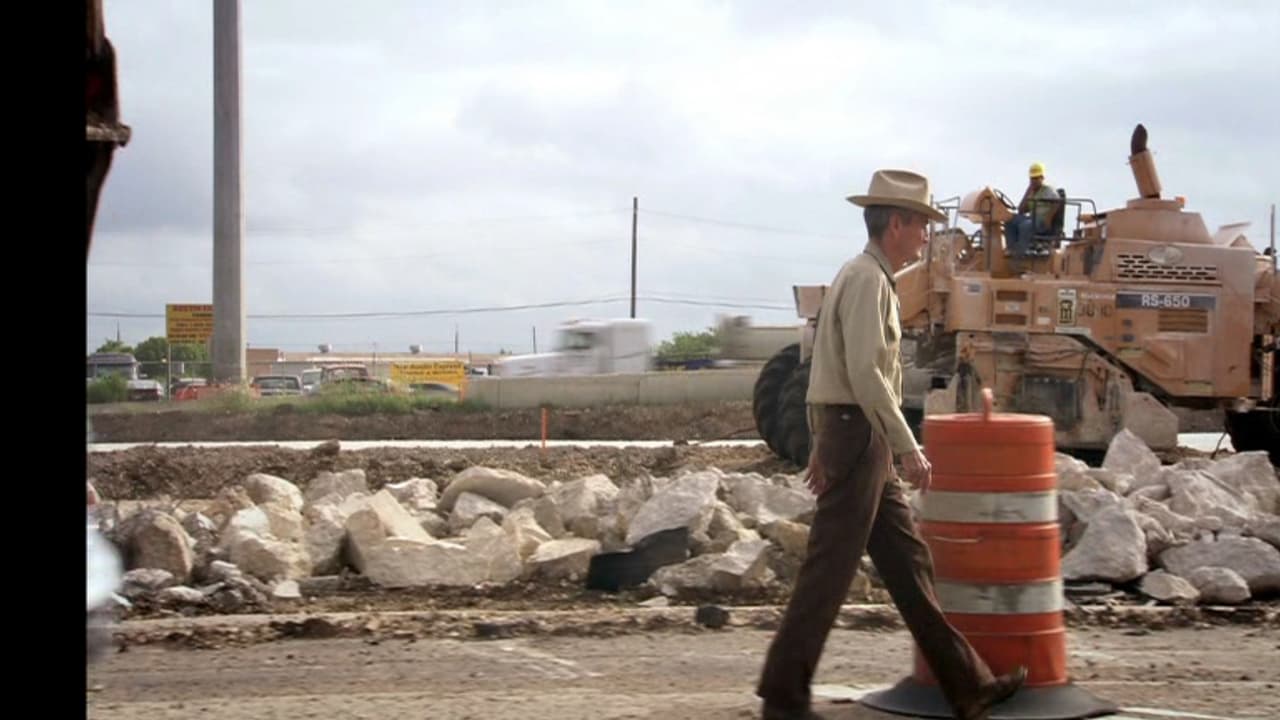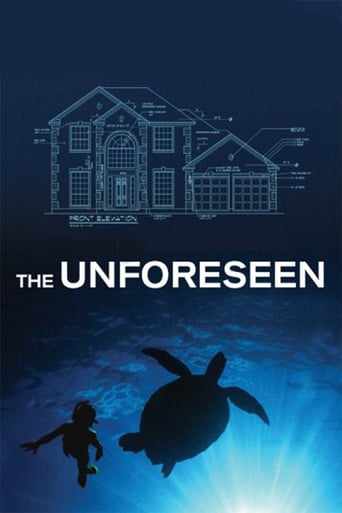

This documentary centers around the commercial development of the land around Austin, Texas, particularly Barton Springs, a natural spring that locals have used for recreation for years. The future of the aquifer beneath, which waters cities like San Antonio as well as Austin, is also problematic. Whence the water for the sprinklers on the golf course? Where does the weed killer from all those lawns settle? We hear the guy, Gary Bradley, who sounds reasonable enough, nobody's notion of a greedy, reckless money monger, who bought up the land and intended to put a planned housing development on it -- almost identical new houses, golf course, a green belt right out of Lewis Mumford, and the rest. It was opposed by Austin's considerable community of activists and was stymied -- after Bradley had put money "up front" for sewers and some infrastructure -- stymied by limitations on the number of houses he could build on the land. He then teamed up with a notorious mining outfit that hired a lobbyist. The result, however one wants to twist it, was a victory for the developers. There is a Wal-Mart Supercenter in their future."Land developer." That's an interesting concept. A land developer is someone like Bradley who buys a great area of land then chops it up into smaller parcels and sells them at a profit. In that sense, a butcher is a "cow developer." Robert Redford reminisces about the summers he spent at Barton Springs as a boy. Willie Nelson is around to make a few comments. Bradley is articulate and intelligent and frustrated. The lobbyist is smooth and patient, musing on his work as he paints and builds model warplanes. But the most articulate commentator is a redneck farmer whose corn field are disappearing, engulfed by urban sprawl. "All houses," he says. "Ain't no more farms. Farmin' is out. . . . What they gonna eat when there's no more farms? That's what I want to know." He echoes the Reverend Thomas Malthus who saw this dilemma coming two hundred years ago.Malthus is thought of as discredited because his predictions didn't materialize as soon as expected. (The industrial revolution came as a surprise.) But the proposition remains the same. "The power of population is indefinitely greater than the power in the earth to produce subsistence for man" The environmentalists we see, some of whom sound a little kooky, have a point when they argue that developers think in terms of "cost" and others think of "value." We can measure and, to some extent, like Bradley, predict how many dollars we may make in profit or lose by taking the wrong chance. But one of the environmentalists states that she is turned off by golf courses because they are too perfect, too manicured, an artifact, but not God's artifact. What is the dollar value of, say, the Grand Canyon? Why not build forests of motels, souvenir shops, and fast food places along both its rims? And lush gated communities at the Sonoran bottom? The value may be completely lost, sold down the river, but think of the profit.The environmentalists will lose in the long run if things don't change dramatically -- and soon. In the last forty years the population of the United States has grown from 200M to more than 320M. The earth's population in 1950 was about 2B. Today it's more than 6B. By 2050 it will approach 12B. It's a familiar trajectory to anyone who's studied population irruptions and the crashes that follow, yet the Chinese seem to be the only nation on earth that recognizes the problem, let alone tries to do anything about it. I said "soon" before because there is a lag time of about two generations between doing something about the problem and realizing the effect. In other words, if you wait until the dimensions of the problem are self evident, it may be too late.The film is slanted towards this point of view without attacking the explosion of human beings directly. I'm not sure the producers themselves, including Robert Redford, understand where the root of the problem lies. Making money the way Gary Bradley has is, as Redford points out more than once, making short-term profits at the expense of long-term values. But he also notes that the problem goes beyond Barton Springs. The point is not merely to save the springs and the Austin countryside from developers. It's that we must save the earth from ourselves.There's a challenge for environmentalists and developers both, and neither seems ready to meet it. It's not always easy to interpret Malthus. ("Improper arts to prevent the consequences of irregular connections" may be a reference to abortion.) He suggested that if we didn't check our appetites for reproduction, nature would, in the form of "vice" and "misery." Vice, left undefined, probably means crime. Misery I think most ethologists would define as stress-related disorders like ulcers or the complete breakdown of social organization, like that found in Calhoun's "behavioral sinks." Judging from this movie, the way it circumscribes itself, our capacity for over-reproduction is only exceeded by our capacity for denial. Pretty gloomy stuff. I guess that's why Malthus's notion is called the dismal theorem.
... View MoreI coincidentally live in a section of Texas that is heavily wooded, mostly prominently with tall, old-growth Pine trees. In the 22 years I have lived here I shudder a bit each time I witness a plot of lend being clear-cut to make yet another "subdivision" or "business park", wondering about the mentality that drives the people behind these developments.This film, "The Unforeseen", helps answer that question, delving into the mind of Texas Developer Gary Bradley.Gary Bradley grew up far from the big city, in a rural farming community, but always knew he wanted to make something more of himself. He ended up at the University and later in Austin as a developer. He was the kind of developer who had the big plans, but by his own admission was lousy with the accounting. As a result he and his company went bankrupt and he ended up in jail. His story is folded into the broader story of how two segments of society can be at odds.The tragedy that ensued was the spoiling of Barton Creek, an almost religious location for many on the one side that wants to preserve nature. The other side are all those who relish the jobs and boost to their economy that "development" brings.The conservation group succeeded in convincing Texas that development of an area immediately upstream of Barton Creek would spoil the area, and one step in the process was to have then governor Ann Richards veto a bill that would have "grandfathered" zoning and construction regulations, which would have permitted development under old rules, even if modern technology shows that it would do undue harm. But when good old liberal, business partner George Bush got elected, the bill was re-introduced and this time Bush signed it, signaling the gradual death of Barton Creek. Ironcally the same Bush who initiated the unwise war in Iraq.What this movie goes to show is how one incompetent person (in this case George Bush) can undo and override the efforts of untold numbers of good-intentioned people.Robert Redford was a producer for this film, and he is shown in it. It is interesting that he said he learned to swim in Barton Creek when he was 6 years old.Good film, but hard to watch as it clearly shows the human stupidity at work.
... View MoreFor six months last year I worked in Austin, Texas. There were many things I didn't understand about the place. It has a vibrant live music scene and a semi-official slogan of "Keep Austin Weird" but I found it packed with freeways, office parks, and housing developments with no more than occasional patches of trees and grass. Many of the local people were very nice but, when you got to know them, defensive and depressed. Seeing The Unforeseen helps me to understand why.The first part of the movie shows an initially successful community effort to stop a large upscale housing development that would destroy Barton Springs, an aquifer and natural pool. There are beautiful shots of it from the 1980s and 90s, combined with documentary footage of meetings and hearings about development permits. Unlike the villains in Michael Moore movies, developers and purchasers of the suburban homes are allowed to speak for themselves. They emerge as sympathetic people caught in a trap that makes a fetish of growth and home ownership regardless of their consequences.Things change in Austin when George Bush becomes governor of Texas in 1995. His predecessor, Ann Richards, vetoed a pro-development measure that would have overridden environmental decisions made by the Austin City Council. Bush approves the bill with his now familiar smirk. The state legislature makes community action irrelevant and in a few years Barton Springs becomes a polluted ditch.What's best about the film is its refusal to provide easy answers. Austin, like Dallas and Houston, has become a boom town, especially for makers of computer software. People come to Austin from all over the world and many of them make good money. They want to buy houses. Their employers want office space. It's inevitable that aggressive entrepreneurs will recognize opportunities and do everything they can to promote development. A question that the movie implicitly asks but does not directly answer is exactly what, under these circumstances, should be done.Perhaps the answers remain unstated because they are hard for participants in a consumer society to accept. They may require a standard of living that places fewer conveniences at our fingertips, dwelling in apartment buildings rather than single-family homes, and riding municipal buses rather than cool cars. Most of all, social stability and preservation of the natural environment would need to be given higher priorities than economic opportunity and growth.The biggest problem with The Unforeseen is its multiplicity of themes. First and foremost is the conflict between preservation of the natural environment and economic growth. Pictures of beautiful nature support this theme and are well executed. However, footage of a white-coated physician talking about blood capillaries and cancer cells results more in confusing similes than compelling metaphors. The recitation of a Wendell Berry poem about unforeseen consequences is nicely spoken but hardly relevant what happened to Barton Springs was foreseen. A shorter, simpler film might have better made its points.
... View MoreRiveting narrative of a classic confrontation between land developers and the environmental community in Austin, Texas. At issue is the economic development of land in close proximity to Barton Springs, a naturally spring-fed body of water that has been a treasure in the Austin community for generations dating back to the 18th century. Land developer, Gary Bradley, argues for his right to pursue the American dream at the expense of degrading Barton Springs which has inestimable value to the community. Individual property rights are in conflict with community rights to an invaluable natural asset. Dunn presents a balanced view on both sides of this debate with uncommon sensitivity to the people, the community and the natural environment. The pageantry of this narrative is displayed with breathtaking cinematography and motion graphics that highlight Dunn's unique contribution to the world of documentary film.
... View More